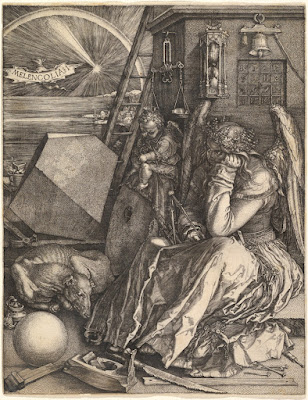Do you have to be inspired and in the mood to do good work? Howard Pyle didn't think so. "That is all nonsense," he said. "I frequently have to force myself to make a start in the morning; but after a short while I find I can work. Only hard and regular work will bring success."
 |
| Durer's Melancholia. "It's ironic," observes the Metropolitan Museum, "that this image of the artist paralyzed and powerless exemplifies Dürer's own artistic power at its superlative height." |
That's why it's so important to do these three things:
- 1. If possible, set up a different workstation for writing or sketching. Or literally wear a different hat and pretend you've hired a specialist to help you with the part of the process that stymied you.
- 2. Have a step-by-step process or a trusted workflow that you can plug yourself into. For me, that means doing thumbnail sketches, planning tonal studies, doing a perspective drawing, gathering photo reference, etc.
- 3. At the end of the workday, finish up so that you leave yourself something fun and easy to do when you start up the next session. Then, when you arrive at work the next morning feeling sleepy and uninspired, you've got something you can achieve successfully even without inspiration.
-----

تعليقات
إرسال تعليق